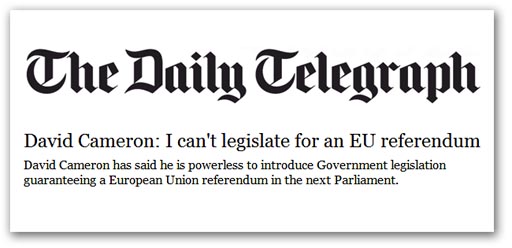When Lady Thatcher died, the piece was temporarily spiked and Lawson instead had a eulogy published. Then, for reasons of its own – not unrelated to Murdoch's increasing dislike of Mr Cameron – the EU piece was resuscitated yesterday, giving the false impression that it was in response to UKIP's performance in the county elections.
The Murdoch agenda is now plastered all over the front page of The Times, with the lead story on the print edition declaring: "Voters tell Cameron to cut Europe down to size". Cameron is being warned that he "must scale back Britain's relationship with the European Union to little more than free trade" or risk losing a referendum.
The fatuity of this call is matched only by the unhelpfulness of Lawson's call for the UK to leave the Single Market – something guaranteed to bring corporate business to the ramparts in defence of its interests, spewing FUD all over the terrain.
But it is also a measure of the intellectual disarray of the Conservatives and media, none of whom seem able to understand that the only way we can possibly "scale back Britain's relationship" with the EU is by invoking an Article 50 notification.
Such a straightforward option clearly eludes Mr Cameron, who is now stymied by the rigidity of coalition politics, professing that he "can't legislate for an EU referendum".
More than 100 MPs have called on Mr Cameron to legislate in this Parliament, in a letter organised by John Baron, MP for Billericay. But in a reply to Mr Baron dated 30 April, Mr Cameron admits that no such legislation is currently possible.
Cameron wrote that the government's legislative programme was founded on the Coalition Agreement which did not include legislating in this Parliament for an "in-out" referendum. For the government to be able to bring forward a referendum Bill, "we would require the agreement of our coalition partners which, as things stand, is not forthcoming", Cameron adds.
Most likely, if Mr Cameron requires the assent of his coalition partners to run a referendum Bill past parliament, he would also need their permission to invoke Article 50. That, effectively, condemns him to constructive inactivity. All he can do is promise to stick to his original plan, of giving voters "a proper choice" between "staying in a reformed EU and leaving", with a referendum conditional on the Conservatives winning at the general.
However, Simon Jenkins in the loss-making Guardian argues that Cameron should go for a "mandate referendum"and call Clegg's bluff. The one thing Clegg fears more than a referendum on Europe is an early general election, he says. Cameron could argue that he was acting decisively on the expressed wishes of the British people.
Which such confusion at the heart of the debate, the way is wide open for an incisive contribution from the leader of UKIP, the only political party dedicated to withdrawal from the European Union.
But, instead of that, we get a piece from ten-pint Nigel Farage complaining about "three-pint Eurosceptic heroes", his message doing nothing much more than illustrate that the only eurosceptic party in town still does not have a settled policy on how to leave the EU.
No doubt the worst for wear after his rations, Farage is all over the place, demanding a referendum before the general election, without the first thought of how he might win it, or whether, indeed he can. And for want of that, it is evident that he his pinning his hopes on another "stunning victory" at the euro-elections, as if that was actually going to achieve anything of substance.
In the absence of any clarity, we thus have to make do with yards of extruded verbal material (EVM) from the media, none of it of any consequence. People tired of living can sate themselves on the ponderous editorial in the Independent, or the blathering of Mark D'Arcy on the BBC website, if only to confirm that a surfeit of quantity does not quality make.
Basically, the media, which has never been able to offer any coherent reporting on the issue of European integration, is running to form. The only single mention we can find of Article 50 is here, drowned by the torrent of inconsequential fluff that takes us no further forward.
But, if there is one phrase for which the media can be commended, it is in the Financial Times, which tells us that this issue is "not going away". In this, at least, it is right.
COMMENT: COMBINED REFERENDUM THREAD
